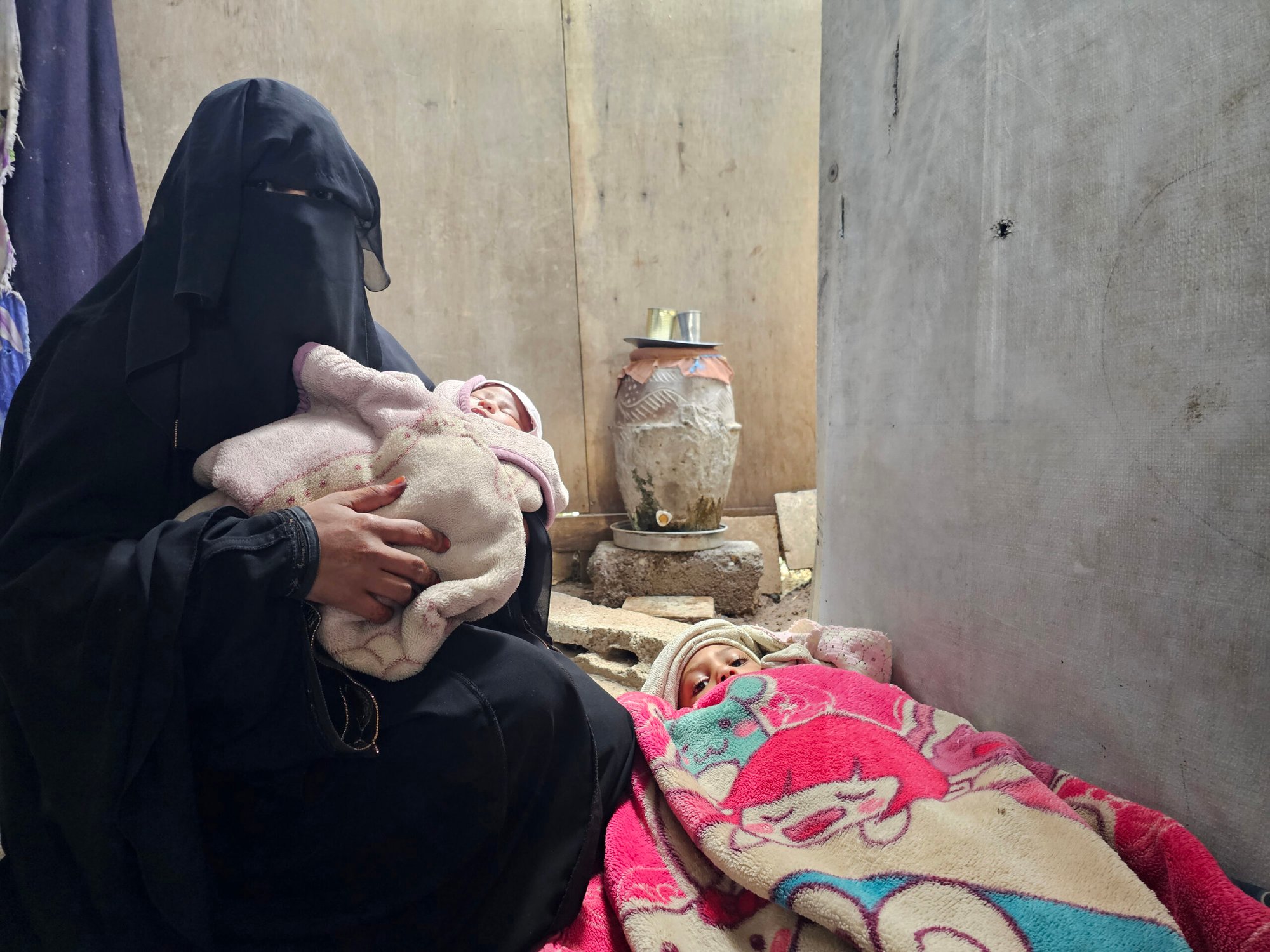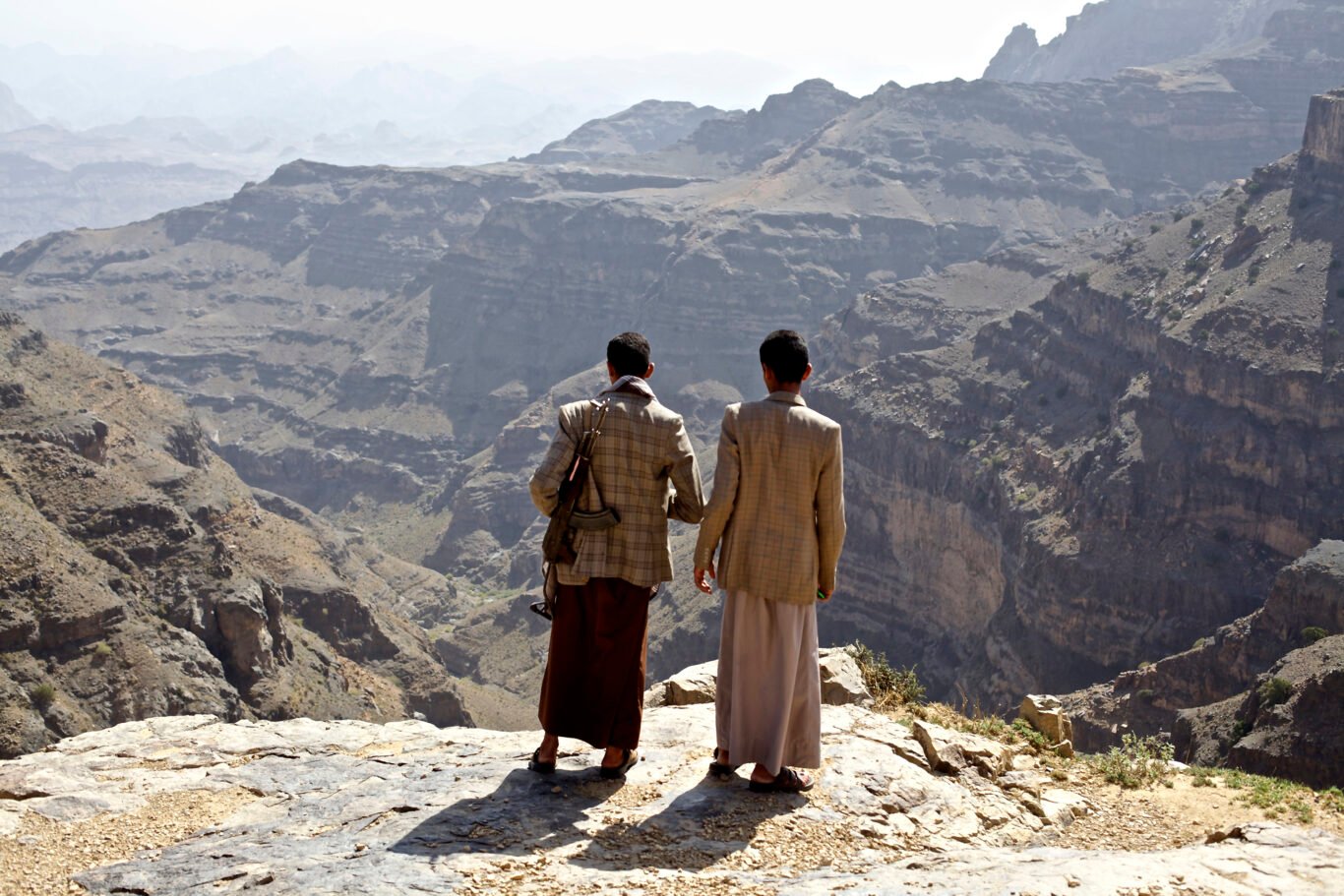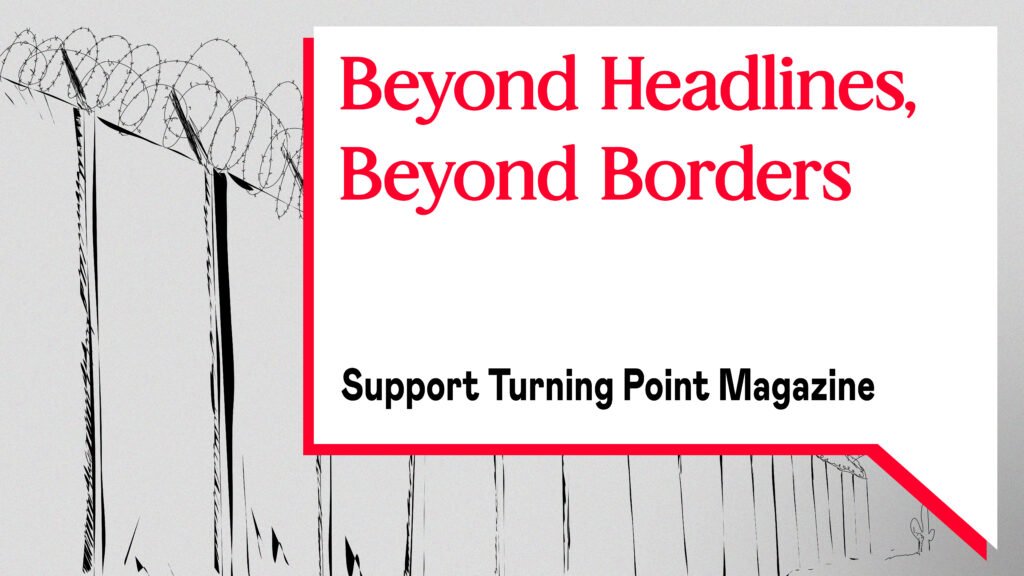Cover photo: Shorooq, a displaced from woman from Saada, at Dharawan camp in Sana’a. ©Laura Silvia Battaglia
It was August 2022, sometime around 3 a.m., when we arrived at the Naqil Yaslah checkpoint, some 40 kilometers south of the Yemeni capital Sana’a. The guards emerged from a tiny hole, showing off their weapons and chewing khat, a local plant-based drug popular in Yemen. It was dark, in the deep night. They asked my husband to get out of the car “with the woman who is with you”—that is, me, of course—and carefully searched each of our suitcases.
We were tired after traveling all night from Aden to Sana’a, up and down the mountains where we first found a sandstorm and then floods in the proximity of a wadi—that is, a ravine, or channel that is dry except in the rain season. It was an exotic nightmare for us; the worst journey inside the country since the beginning of the war exactly ten years ago.
In these years, we went back and forth many times, often choosing to travel by bus. It was worth it because, in a bus, we could see what happens to Yemenis trying to cross the country now divided in “the North”— controlled by the Shia-Islamist Ansar Allah militia, or “the Houthis”— and “the South,” still under the control of Yemen’s internationally recognized government.
This time, we got into a car with a crazy driver—it was a bad idea.
I still do not know how we arrived safe, considering the number of accidents and cars and busses falling down the mountains in the night. But the journey passed well and safely, Yemenis would say maktub: “it was written in the book of God.”
Back at the checkpoint, the guards’ first sentence to my husband was an inquiry about why and how we traveled, and why and how he had not stayed in the country ten years ago to fight with the Houthi militia against the central government. He was prepared to answer such questioning with the pure truth: “I got married, and I left the country.”
Then, the investigation turned on me: “Where is your wife? Who is she? Why does she have so many stamps of Arab countries in her passport?” It was a risky choice for him to answer: “she’s a journalist.” Instead, he said: “She’s a professor at a university.” I do have a university teaching position, so in fact this was also the pure truth.
Usually, after the explanation, things went on smoothly, and we passed the checkpoints. But that August night in 2022, things went differently for the first time. The guards were suspicious. They blamed my husband for traveling with a woman, more so in the midst of the night, even if I was his wife. They confiscated my Italian passport, telling my husband not to react, not to fight, and come to the Ministry of Foreign Migration in Sana’a after ten days to find out if my passport was there. They needed to proceed with an investigation.
If the investigation went in a dangerous direction, me and my husband were facing a huge risk. We could even be arrested for “foreign suspicious activities”—a euphemism for spying. More him than me, because since 2022 he has been my “guardian” (mahram) in Yemen, and he is responsible for all my actions, even my existence. The investigation went well but that is not what matters. What matters is the gradual erosion of women’s rights in Yemen, happening in the darkness, while nobody is paying attention.
I had heard rumors about the Naqil Yaslah checkpoint already before. These rumors were about women passing the checkpoint in groups, alone, or without men.
The Yemeni law does not require women to travel with a mahram (male relative). However, for the past few years, the gunmen of the Shia militia Ansar Allah have “frequently scrutinized and questioned” women traveling alone, according to the Yemeni NGO Mwatana for Human Rights.
“Ansar Allah members have told women they should only travel with a mahram (male relative), and demanded men traveling with women prove they are related to the woman, for example, by showing the couple’s marriage certificate, or identification cards, if the man and woman are otherwise related,” the NGO concluded from multiple witness accounts. This was exactly the reason why my husband and I used to always travel with a folder of papers proving our full records.
“There’s no valid reason for travel.” As of today, this sentence is still repeatedly uttered by the Yemeni authorities of the North when a woman needs a permit, declaring she will travel alone.
These measures are quite new in the country. For years, even during the war, the tribal roles allowed women to travel alone and did not expect men to explain their relationship with female co-travelers. But a kind of security paranoia is spreading in the areas controlled by the Shia militia, which is increasingly frightened by the potential infiltration of spies. In addition, these measures stop women from traveling to work, a goal the group is arduously pursuing.
However, the burden starts already at the Migration Office, where I waited for one hour, hidden in the car, before my passport returned in my husband’s hands. I stayed hidden because the officers told us “this is not an issue of the woman but of her husband. She doesn’t need to be with us in the office, and we don’t need to see her.”
Mwatana has documented a number of these incidents throughout the last five years in both the Naqil Yaslah checkpoint and the Migration office. In the latter, the organization says women and their families are subjected to “humiliating and offensive interrogations which violate their privacy by delving into personal details.”
“These sessions are laden with insulting insinuations and accompanied by ostentatious sermons lacking grace and respect, all by authorities purported to uphold virtue, customs, and traditions. In the end, the decision to grant or deny permits rests solely on the discretion of the individual authorized by the AnsarAllah; completely disregarding Yemeni laws and regulations, and ignoring the actual purpose and circumstances behind the travel,” the NGO reported in 2024.
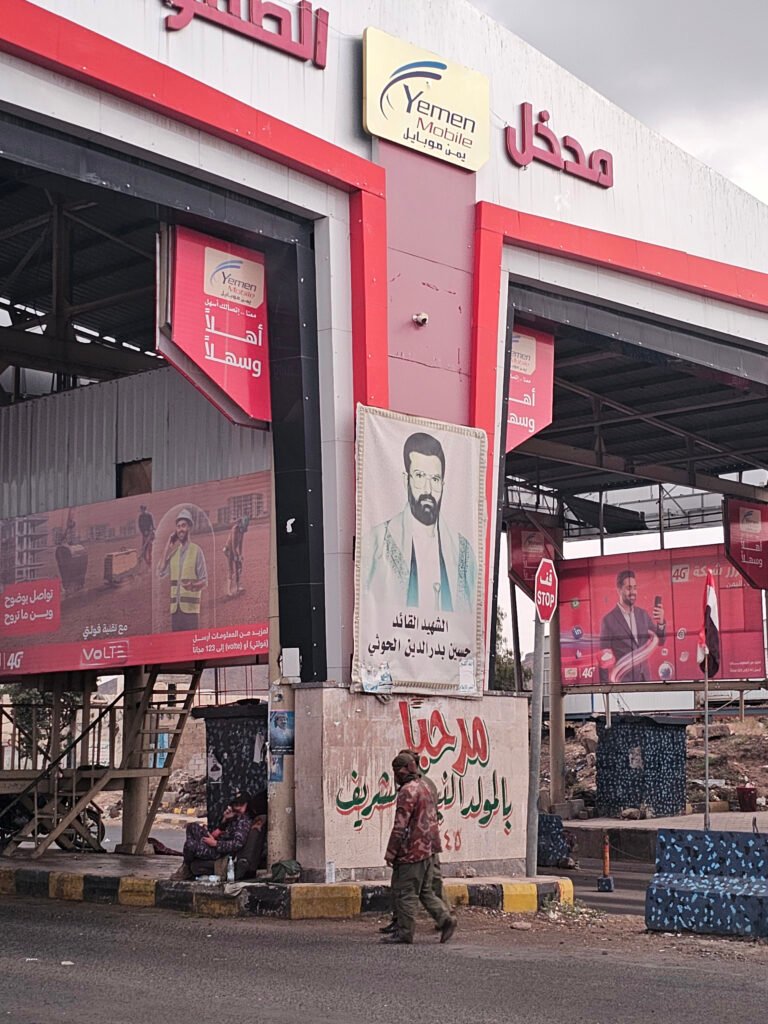
The Check-points of Humiliation
The most prominent incidents have all been recorded at Naqil Yaslah, where authorities have stepped up restrictions on traveling women and confiscated their passports in some cases.
The first known incident happened in November 2021. After a long journey from the southern governorates, four women traveling by car were stopped by Ansar Allah’s gunmen in the middle of the night. They blocked the women’s passage from 11 p.m. until 5 a.m., subjecting them to various accusations and harassment.
“They referred to us as a ‘prostitution cell.’ They were seven armed men who verbally harassed us, put us under terrible psychological pressure for six hours, took our passports, prevented us from getting out of the car, and searched our phones, computers and bags. [Those were] moments of Hell,” one of the woman told Mwatana.
According to the interviewed women, “where is the mahram?” was among other questions addressed to them. The human rights group reported that the Ansar Allah only allowed the women to leave after signing pledges that they would never again travel without a mahram. The women were then threatened with imprisonment at the Security and Intelligence Bureau if they left Sana’a again without a male guardian.
Another documented incident took place in mid-January 2021, when a 30-year-old woman was stopped for several hours at a checkpoint near Hajjah city, 123 kilometers northwest of Sana’a. Using offensive language and threatening her, the Ansar Allah members said she was stopped because she was traveling without a mahram.
“The gunmen were looking at me as if they had caught me in an indecent act. I was insulted and verbally abused. The officer even asked if I was still a virgin. He also threatened me with imprisonment and disciplining,” she said. She was allowed to leave only after her male relative came (from another governorate) and signed a pledge that she would never again travel without a mahram.
In a two-day period, Mwatana recorded ten similar incidents in Hajjah governorate. Some witnesses told the human rights organization that Ansar Allah members had said they were implementing orders from higher up in their organization that banned women from traveling without a mahram, “especially with cars belonging to organizations.”
The NGO also cited an unspecified Ansar Allah circular from September 2021 stating: “It’s not allowed for a woman to use transportation means without a mahram. This order is applied in the city of Hajjah, and those who violate it will be fined 200,000 riyals [approximately $330] and a cow.”
Ansar Allah’s restrictions on women’s movement, and the harassment of women when doing so, has affected Yemeni women’s ability to move freely, to participate in public and private life, and to work to the point that some women have limited their movement to avoid harassment. Indeed, for nearly five years by now, the arbitrary measures enforced by the militia have obstructed thousands of Yemeni women from fulfilling their work responsibilities, especially those whose jobs involve travel. According to the Mwatana, these “unlawful restrictions have profoundly affected Yemeni female workers,” notably in crucial sectors such as healthcare and humanitarian aid. Moreover, these constraints directly prevent the delivery of vital humanitarian assistance to those most in need, significantly impacting women and girls, in particular.
In a country misrepresented and untold in media, after ten years of civil war, Yemeni women have suffered from direct violations which have undermined fundamental rights gained over long decades of struggle. In addition to this, there have been worsening patterns of discrimination against women and girls, with increasing societal and domestic violence, and a widening gap between men and women in terms of gender-based inequality. The economic crisis and the collapse of services have further aggravated the conflict’s negative effects on women.
Family planning methods
The precarious situation women have fallen into in Ansar Allah-controlled Yemen concerns not only their freedom of movement but also their personal and sexual spheres. Since early 2017, the militia has impeded women’s access to reproductive health care in many areas under its control.
The measures to prevent access to contraceptives started in Saada governorate in northern Yemen with the ban on contraceptive injections in some health facilities in 2019. In early 2020, the Ansar Allah suspended reproductive health activities, including counseling on family planning, in four districts of Saada. The group then intensified restrictions on the sale and circulation of contraceptives and other family planning methods, including birth control pills and condoms, throughout the Saada governorate, culminating in the ban of IUDs (intrauterine devices) throughout the region at the end of the year. Similar policies have been issued in other regions as well.
“I had three miscarriages in the past six months because my husband refused to provide me with contraception,” a 35-year-old cleaning woman from Amran governatorate told the Mwatana NGO. Another man told that “obtaining contraceptives happens in secret and at great risk.”
This happened because, in May 2020, the Ansar Allah-controlled Ministry of Public Health and Population in Amran governorate issued a circular to restrict women’s access to contraceptives. Among other restrictions, the circular directed health centers to provide women contraceptives only in the presence and with the consent of their husbands. Since 2021, the health centers and pharmacies are banned from providing any method of family planning to women unless they had a prescription, the presence and consent of their husbands, and their marriage certificate.
In the capital Sanaa, which is supposedly more open-minded, I tried to ask a pharmacy to get contraceptive pills, but they denied giving them to me and instead demanded my husband to come and give his approval. I decided to not even try.
In my neighborhood, women increasingly tell stories of other women who think about planning abortion in secret. Generally, nobody helps them to make this decision, even using old and dangerous methods, but the fact is that one mouth more to feed is a burden for Yemeni families.
The Yemeni film director Amr Gamal who won attention and appreciation at the last Berlin Film Festival with his movie “The Burdened” tells this story well, with a leer of implications on social, religious, and economic levels. Of course, getting pregnant every year in Yemen is not a burden for the militias which need fighters, young and full of rage, and want to spread propaganda for through many generations. For them, women are only wombs to fertilize a political cause.

Access to Medical Aid in Public Hospitals
After ten years of war, things are not getting any better for old women and people in general. The humanitarian crisis we witnessed with our own eyes is indescribable in words.
In Hodeida, the coastal city where the Houthi militia stores and protects its war vessels and weapons, the only public hospital is a total inferno. The entrance is a hellish circle of men, women, children, and elderly people. They are standing, crouching, and sitting around. The sight of a white coat—it does not matter if it belongs to a doctor, a woman doctor, or a doctor of wrong specialty—stirs a crowd of people to chatter around.
“They are like bees on honey,” joked Dr. Abdu Obaid, the deputy director of the al-Thaura general hospital, while trying to smile as tears linger in his eyes. Each patient offers him a prescription to be signed and he, seraphic and precise, first listens to the request and then adds a sign the sheet. He does not even try to put the pen in his pocket: it would be useless to try to let the ink rest.
After ten years of war and a humanitarian situation that the United Nations has defined as “the worst catastrophe” of the century, we observe with dismay that every corner of this hospital—the only public one in the Hodeida governorate—looks like a shelter for the plague-stricken.
Indeed, the hospital hosts the region’s most advanced center for cholera treatment. The latest patients are in a complex near the main one, all white, all cleaned with chloroform and with limited entrances protected by gendarmes. The patients are distributed into large rooms with twenty beds each: two rooms for men, two for women, and two for children, hosted with their mothers.
“In this hospital, we admit 2,000 patients a day. Of these, in the last few months, 200 a day arrive from all areas of the governorate with cholera in an advanced form,” Dr. Obaid explained.
The situation is worse than ten years ago: the public health system is totally collapsing; doctors—not paid by the central government for seven years—have moved to private health companies which can pay dearly for their services; international donors have withdrawn after the war in Ukraine. Here, we get by as best we can with only the 40 thousand dollars a year made available by the World Health Organization—an amount covering the purchase of diesel for a couple of months.
“Yesterday, we also had a death. A woman arrived at the hospital too late with complications from childbirth: she died, the baby died. She had arrived here with cholera,” Dr. Obaid said, already besieged as he tried to enter his office. Everyone around is screaming, each looking for their temporary salvation.
Health and Social Issues for Displaced Women
Facilities like al-Thaura hospital in Hodeida could even appear like safe places, compared to the IDP camps that have emerged throughout the country. The ten years of conflict have displaced up to 4.5 million people of whom the UN estimates 75% to be women.
In the outskirts of the northern capital Sana’a, the Dharawan camp contains 200 people, who have remained displaced for nine years from cities in the far north of Yemen—such as Saada or Hajja.
Zahra Ahmad Zaid, 50 years old, is from Saada. With a dead husband and her daughter’s family to look after, she is also dealing with stomach cancer. She insists on showing us her swollen abdomen as a proof of her claim’s validity. We believed her without a need for physical examination, as she had shown us her medical papers in a tent that she and her family struggle to keep clean.
Zaid has undergone three surgeries at the Egyptian al-Jumuri hospital in the capital: 19 thousand Yemeni Rial in total, distributed in three patches of six thousand, four thousand, and the three thousand she had already paid. She has no money for the rest of the debt and, therefore, can no longer access chemotherapy or painkillers that could alleviate a life now lived lying down or on all fours. She only takes care to bless God between one lament and another, saying she would reserve the blasphemies “for the war and for those who put us in this situation.”
Zaid claimed that, especially for women, “the access to healthcare is more difficult than before: there are less doctors and less female doctors compared to the first five years of the war. I feel insecure.”
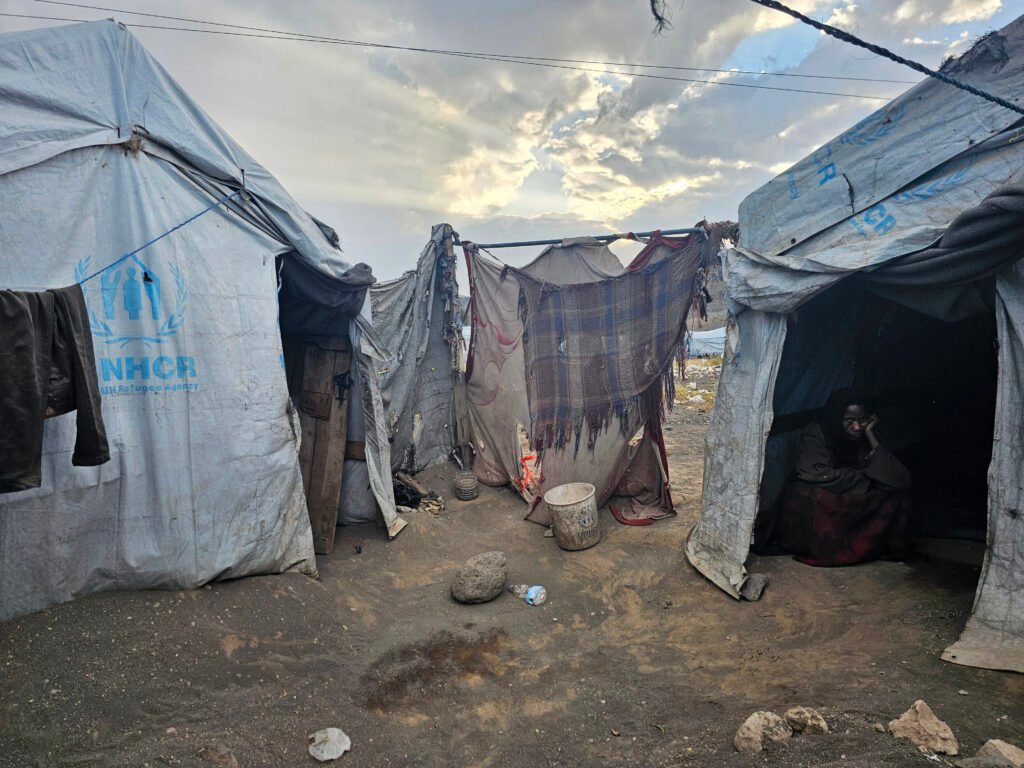
Poverty and mental distress are a few matters amongst many found at the bottom of the abyss into which the country has fallen for over ten years. Besides the consequences of war there is also private interests that drive this situation— together with the lack of humanitarian funds which is further worsened by the suspension of USAID— the choice to allow private clinics to proliferate to the detriment of public health.
The spokesperson for the Minister of Health, Anees al-Ashbahi, told us that “the bomb attacks directed at some hospitals, clinics and services, have led to the loss of 55% of structures, which are no longer functioning.”
However, he stressed that “the main problem is the cut in salaries from the central government in Aden, which has caused 7,000 people in the health sector to flee abroad.” He added that the Houthi government is trying to cover this hole by recruiting staff directly at the universities.
The deterioration of Yemen’s health system is visible at the public al-Sabaaen hospital in Sanaa, once the flagship of Yemen’s women’s and children’s health care system. On the hospital’s entrance, its deputy manager Dr. Hana al-Dubai staged a protest in front of the Health Minister who was visiting the facility.
As the crowd tried to keep the two apart, she cursed the minister for “only caring about his TV appearances: not the patients, not the doctors who work grueling shifts with no guarantees.” Patients and colleagues around the two tried to calm things down, waving their arms in the hospital’s pink-painted corridor, all careful not to say a word too much.
The unfortunate episode ended with a series of phone calls between the bureaucrat and the minister, the letter threatening “exemplary punishment for the woman who dared to speak out.” According to the minister, staging a protest ”doesn’t fit a woman.”
Arbitrary Detention, Torture, and Enforced Disappearances
While Ansar Allah’s rise to prominence has largely driven the changes in women’s daily life in the North, it does not explain women’s everyday hardships in the South, which is controlled by the internationally recognized government of Yemen. Here, exactly in Marib—situated to the northeast of the Yemeni capital, Sana’a— the Yemeni NGO Mwatana documented another series of horrible violations committed against 18 women between April 2016 and July 2023. These violations encompassed nine cases of arbitrary detention, three cases of enforced disappearance, two cases of torture, and four cases of denial of procedural justice.
“These distressing occurrences are part of a larger pattern of 266 incidents involving enforced disappearances, arbitrary detentions, torture, and the denial of procedural justice rights,” the NGO concluded, stressing that these transgressions are violations of the applicable local laws, international human rights law, and international humanitarian law.
One of the victims, a 43-year-old Huda Omar (a pseudonym) described her traumatic detention in the central women’s prison in Marib as follows: “I requested them to inform my husband about my detention; however, he has not been informed. My family only learned about my detention several days later, specifically when I was allowed, in exchange for a sum of money, to make a phone call to my mother.”
“During one of the interrogation sessions, the interrogator demanded that I unlock my mobile phone, which was in their possession. The moment I complied, they copied its contents onto a laptop. They used threats of confining me in a dhaghata (a very narrow cell), extracting my nails, and prolonging my detention indefinitely unless I confessed to the fabricated charges against me. The appalling detention conditions and unrelenting psychological pressure took a toll on my health, resulting in bodily swelling. The woman who was the prison director at that time even callously remarked, ‘Die, and I’ll bury you here,’” she further explained.
Talking about the general prison conditions, Huda said that the echoes of women enduring torture through beatings and electric shocks were distressingly audible.
“On one occasion, a fellow detainee, dressed in yellow, returned to the cell with her garments soaked in blood after a brutal beating on her abdomen. Another detainee underwent such intense torture that she lost her ability to stand or walk, writhing in excruciating pain. Throughout the period of our detention, the International Committee of the Red Cross and other organizations were denied access to visit or communicate with us,” she said. Similar testimonies were recorded from other women by the Mwatana, showing a pattern of deteriorating prison conditions.
“Throughout their detention, these women were subjected to a series of abuses, beginning with their arrest and detention without any lawful cause. The conditions in the detention facilities were dismal, devoid of essential requisites for proper detention—including sanitary facilities and ventilation to adequate sustenance, personal hygiene items, and gender-sensitive considerations,” the NGO concluded its investigation; confirming that the victims were subjected to “various forms of torture, degrading treatment, and forced disappearances” and often denied a due judicial process for their imprisonment.
There is currently no solution to this state of affairs. Unfortunately, the severity of these violations when they target women bring about a disrupted society—a society that crushes women—following the breakdown of legal safeguards, particularly in times of war, as women are the most vulnerable segment within Yemeni society and are disproportionately subjected to gender-based violations. In this regard, there is no difference between the militias’ rule in the North and the recognized government of the South. Everywhere in Yemen, women are going back to a dark age.
Laura Silvia Battaglia
Laura Silvia Battaglia is an Italian reporter, specializing in crisis and conflict areas since 2007. With a particular focus on Yemen and Iraq, she has covered ethnic, religious and gender minorities, migration, terrorism, and human and arms trafficking over the years. She is an author and host for Radio3 (Radio3Mondo) and a documentary filmmaker.
